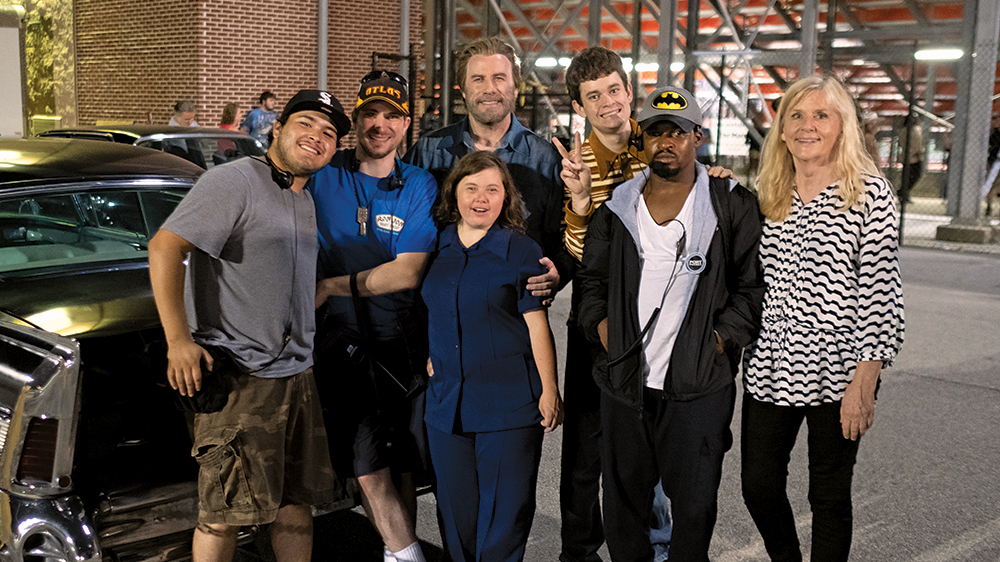Behind-the-Camera Crews With Disabilities Demand Inclusion
By Tim Gray
LOS ANGELES (Variety.com) – Hollywood, aiming for more diversity, hopes inclusion riders will help broaden the composition of behind-the-camera crews. But so far, people with disabilities — who comprise nearly 20% of the population — have been left out of the conversation.
David Shore, creator of Sony TV-ABC’s “The Good Doctor,” is one of the few execs who has been scrupulous about giving opportunities to people with disabilities behind the scenes. “These people are incredibly underrepresented in films and TV,” he says. “It’s important to have characters like this on-screen, but it would be hypocritical to put them in front of the camera and not behind. They’re capable of so much, and we should make it possible.”
Though statistics on below-the-line hiring are shockingly low, some individuals are proving that the practice is successful.
James Cude has been working as an editor for 18 years, on series including MTV’s “Suspect” and Syfy’s “Cosplay Melee” and “Haunted Highway,” among others. Since he was a teenager, he’s had sensorineural hearing loss, often caused by damage to the inner ear. “People don’t think of an editor as someone who’s hard of hearing,” says Cude. “But I can hear enough sounds. For the rest, I have a lot of techniques I’ve learned over the years, plus some really good technical tools that allow me to do my job.”
Those tools include audio streaming from computer to hearing aids (for dialogue), wave forms (for music) and automatic online transcriptions. “There are some things I can do better than most people, some worse,” he says simply. “But that’s true of everyone. It balances out.” And he’s been consistently getting work, without an agent, via word of mouth.
Since 2007, Joey Travolta and his Inclusion Films have been offering training for individuals with developmental disabilities, who learn by working with below-the-line pros. The organization also helps them find work. This summer, Travolta placed five PAs on the indie film “The Poison Rose,” starring brother John Travolta, Brendan Fraser and Morgan Freeman.
Able Castillo, one of the four Inclusion Films members on the autism spectrum, did so well in the camera department he was bumped up to video village. Marissa Erickson, with Down syndrome, worked in craft service. The others had jobs in the art department, in the production office and as an on-set PA. Travolta addressed this as any exec would: Find the person whose skills are a match for the job.
“They knocked it out of the ballpark,” he says of the five. Significantly, two got enough hours for union eligibility. That means they can apply for union jobs. “They were given an opportunity, and more will come their way,” Travolta sums up. “This validates what many of us have worked hard for — just to see people get an opportunity.”
PA positions help solve a big challenge for people with disabilities: finding entry-level work. “This is a door that’s been closed, and I’ve been trying to break it down for years,” Travolta says.
Another hurdle is perception: Employers often have an irrational fear about hiring someone with a disability. Camera operator W. Kirby Washington has great credits (“Bulworth,” “Galaxy Quest,” “Alice in Wonderland”), but jobs are harder to find since he began walking with a cane — ironically, the result of work. In 2003, he suffered spinal cord damage when he was thrown off a flatbed train car during filming, “because a fellow crew member ignored the safety plan,” says Washington. A second on-set accident was caused in 2009 by a spooked horse.
He follows the usual routes to job hunting, including networking, but the cane scares a lot of potential employers, says Washington, who has lost motion-picture healthcare after 22 years. “I’m just trying to survive as a father who wants to provide for my family again,” he adds. “Hollywood unions have to make a better effort at fairly representing all members in the bargaining unit — or in this post-Janus era, we will be lunch,” he says of the recent Supreme Court decision that limits the power of public sector unions.
Though Washington has been knocked around (literally), he is upbeat. Rather than list the sources of his frustration, he instead names honchos who were enlightened, including “Avatar” line producer Peter Tobyansen and writer-director James Cameron: “They’re top of the line.”
Editor Cude adds, “When I’ve seen someone with a disability starting a job, the biggest hurdle seems to be their own ‘I can’t do this.’ To those people, I’d say, ‘Don’t be afraid of it.’ And to people who are hiring, I’d say, ‘Don’t make assumptions that the person can’t do something. Assume that they can.’ ”
Mark Rozeman, a script coordinator on “” who was promoted to staff writer, is on the autism spectrum. As he sums up, “Employers want someone who can solve problems. For many people with disabilities, life is a series of problem-solving scenarios, so they’re good at it. This is an industry where the jobs are draining, with constant challenges and weird hours; you want someone with determination on your team. Who wouldn’t want that?”

